How to use json.stringify in JavaScript
Encoding is a method of converting data into another form. In the case of JSON, JSON is described as a JavaScript object, but the data format of its content is just a string. Actually, reading a json file is just a string, so it can't be treated like an object. Encoding will allow you to use it as an object in JavaScript. Let's take a closer look at how to use JavaScript to encode json.
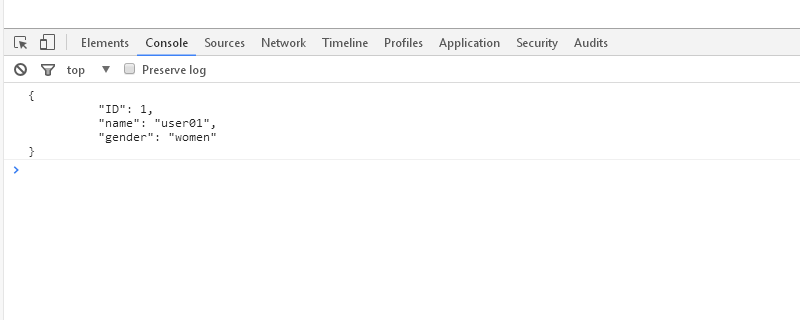
To encode we use JSON.parse.
var json_s = '{"ID": 1,"name": "user01","gender": "women"}'
console.log(typeof(json_s))
var json_o = JSON.parse(json_s)
console.log(typeof(json_o))
console.log(json_o.ID)json_s defines json, which is just a string encoded into an object via JSON.parse.
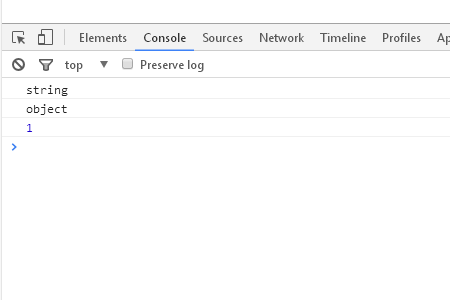
After reading the encoding, let’s look at how to decode
Decoding is to return the encoded version to its original form.
We use the JSON.stringify function to return a string.
Let’s take a look at the code
var json = '{"ID": 1,"name": "user01","gender": "women"}'
console.log(typeof(json))
var encoded_json = JSON.parse(json)
console.log(typeof(encoded_json))
var decoded_json = JSON.stringify(encoded_json)
console.log(typeof(decoded_json))The running results are as follows
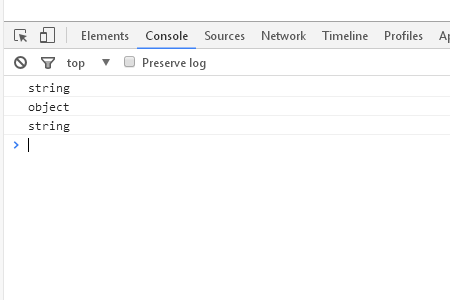
You can see that the decoding is completed correctly.
After reading the above content, let’s get to the point. What is json.stringify? how to use?
json stringify is a function that decodes JSON.
Let’s format it while decoding it using json stringify
JSON.stringify() can take three parameters.
The first is the encoded value, which is an object, as in the example.
The second one can be called replacer and specify the callback.
I won’t explain it in detail here, so I will add null to the code.
The third one is used to specify the indentation for formatting this parameter.
Let’s look at the specific code
var json_obj = {"ID": 1,"name": "user01","gender": "women"}
var decoded_json = JSON.stringify(json_obj, null, " ")
console.log(decoded_json)The running result is as follows: it will be indented according to the spaces placed
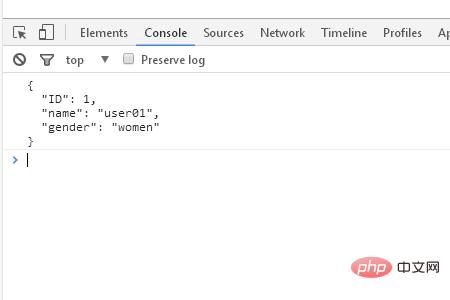
Put more spaces and you will see it more clearly. The code is as follows
var json_obj = {"ID": 1,"name": "user01","gender": "women"}
var decoded_json = JSON.stringify(json_obj, null, " ")
console.log(decoded_json)The result is as follows
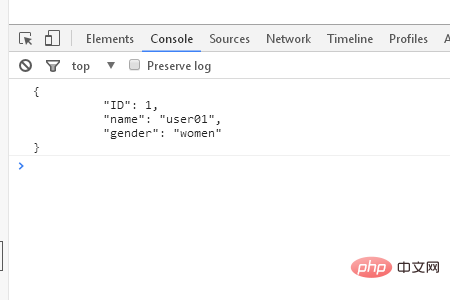
In addition, although you can add spaces, It is difficult to see how many indents are explicitly specified, so you can also directly specify the value for indentation
var json_obj = {"ID": 1,"name": "user01","gender": "women"}
var decoded_json = JSON.stringify(json_obj, null, 2)
console.log(decoded_json)The results are as follows
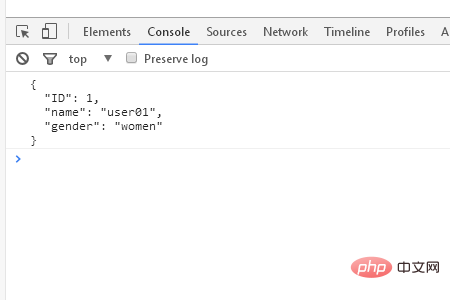
Let’s take a lookUse json.stringify to decode an array
The code is as follows
var arr = ["a","b","c"]; var decoded_json = JSON.stringify(arr) console.log(decoded_json) console.log(typeof(decoded_json))
The running results are as follows: Correct decoding
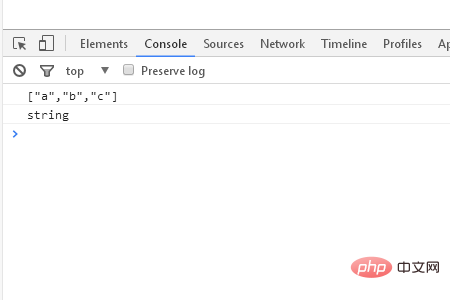
It doesn’t matter whether the object contains an array
The code is as follows
var arr = {"test": ["a","b","c"]};
var decoded_json = JSON.stringify(arr)
console.log(decoded_json)
console.log(typeof(decoded_json))The running result is as follows
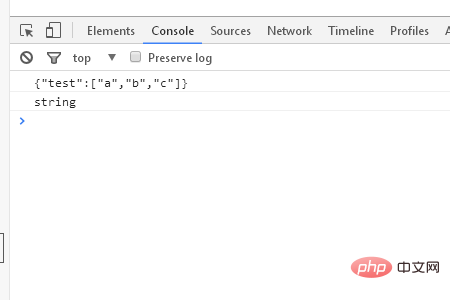
The above is the detailed content of How to use json.stringify in JavaScript. For more information, please follow other related articles on the PHP Chinese website!

Hot AI Tools

Undresser.AI Undress
AI-powered app for creating realistic nude photos

AI Clothes Remover
Online AI tool for removing clothes from photos.

Undress AI Tool
Undress images for free

Clothoff.io
AI clothes remover

AI Hentai Generator
Generate AI Hentai for free.

Hot Article

Hot Tools

Notepad++7.3.1
Easy-to-use and free code editor

SublimeText3 Chinese version
Chinese version, very easy to use

Zend Studio 13.0.1
Powerful PHP integrated development environment

Dreamweaver CS6
Visual web development tools

SublimeText3 Mac version
God-level code editing software (SublimeText3)

Hot Topics
 Replace String Characters in JavaScript
Mar 11, 2025 am 12:07 AM
Replace String Characters in JavaScript
Mar 11, 2025 am 12:07 AM
Detailed explanation of JavaScript string replacement method and FAQ This article will explore two ways to replace string characters in JavaScript: internal JavaScript code and internal HTML for web pages. Replace string inside JavaScript code The most direct way is to use the replace() method: str = str.replace("find","replace"); This method replaces only the first match. To replace all matches, use a regular expression and add the global flag g: str = str.replace(/fi
 Custom Google Search API Setup Tutorial
Mar 04, 2025 am 01:06 AM
Custom Google Search API Setup Tutorial
Mar 04, 2025 am 01:06 AM
This tutorial shows you how to integrate a custom Google Search API into your blog or website, offering a more refined search experience than standard WordPress theme search functions. It's surprisingly easy! You'll be able to restrict searches to y
 Build Your Own AJAX Web Applications
Mar 09, 2025 am 12:11 AM
Build Your Own AJAX Web Applications
Mar 09, 2025 am 12:11 AM
So here you are, ready to learn all about this thing called AJAX. But, what exactly is it? The term AJAX refers to a loose grouping of technologies that are used to create dynamic, interactive web content. The term AJAX, originally coined by Jesse J
 Example Colors JSON File
Mar 03, 2025 am 12:35 AM
Example Colors JSON File
Mar 03, 2025 am 12:35 AM
This article series was rewritten in mid 2017 with up-to-date information and fresh examples. In this JSON example, we will look at how we can store simple values in a file using JSON format. Using the key-value pair notation, we can store any kind
 8 Stunning jQuery Page Layout Plugins
Mar 06, 2025 am 12:48 AM
8 Stunning jQuery Page Layout Plugins
Mar 06, 2025 am 12:48 AM
Leverage jQuery for Effortless Web Page Layouts: 8 Essential Plugins jQuery simplifies web page layout significantly. This article highlights eight powerful jQuery plugins that streamline the process, particularly useful for manual website creation
 What is 'this' in JavaScript?
Mar 04, 2025 am 01:15 AM
What is 'this' in JavaScript?
Mar 04, 2025 am 01:15 AM
Core points This in JavaScript usually refers to an object that "owns" the method, but it depends on how the function is called. When there is no current object, this refers to the global object. In a web browser, it is represented by window. When calling a function, this maintains the global object; but when calling an object constructor or any of its methods, this refers to an instance of the object. You can change the context of this using methods such as call(), apply(), and bind(). These methods call the function using the given this value and parameters. JavaScript is an excellent programming language. A few years ago, this sentence was
 Improve Your jQuery Knowledge with the Source Viewer
Mar 05, 2025 am 12:54 AM
Improve Your jQuery Knowledge with the Source Viewer
Mar 05, 2025 am 12:54 AM
jQuery is a great JavaScript framework. However, as with any library, sometimes it’s necessary to get under the hood to discover what’s going on. Perhaps it’s because you’re tracing a bug or are just curious about how jQuery achieves a particular UI
 10 Mobile Cheat Sheets for Mobile Development
Mar 05, 2025 am 12:43 AM
10 Mobile Cheat Sheets for Mobile Development
Mar 05, 2025 am 12:43 AM
This post compiles helpful cheat sheets, reference guides, quick recipes, and code snippets for Android, Blackberry, and iPhone app development. No developer should be without them! Touch Gesture Reference Guide (PDF) A valuable resource for desig






